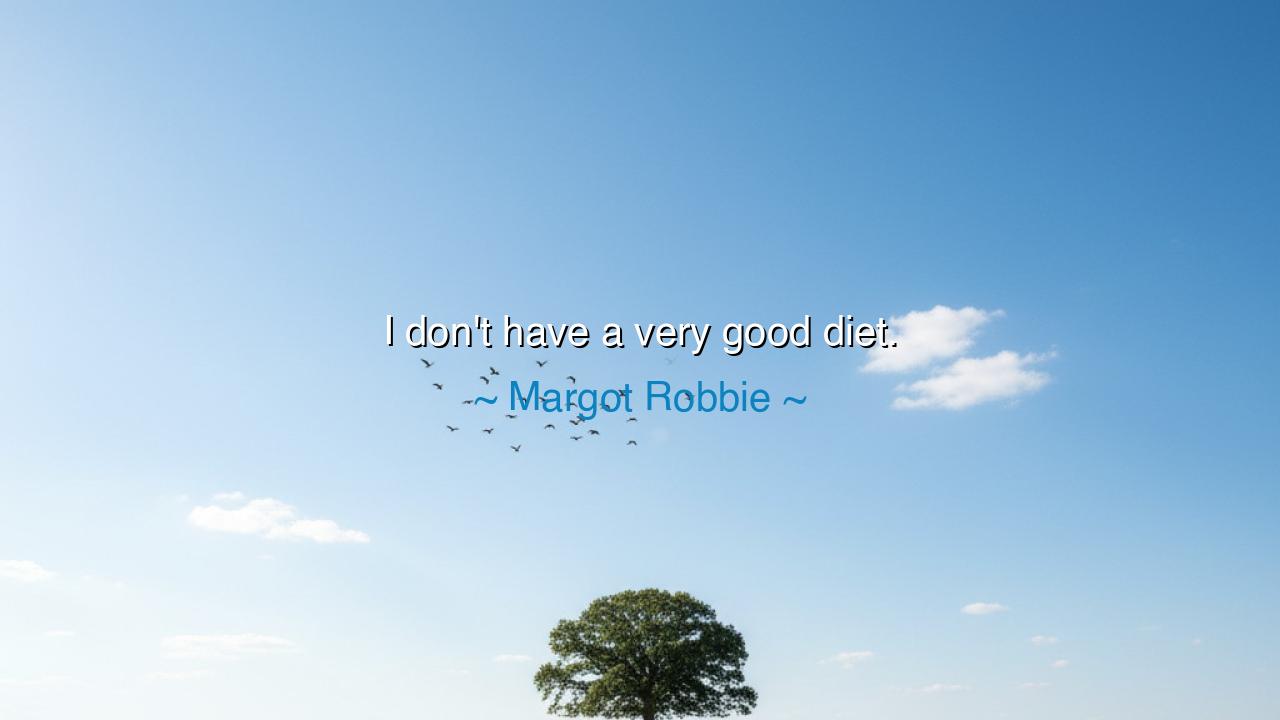
I don't have a very good diet.






In the simple and candid words of Margot Robbie, we hear a confession that carries a quiet depth: “I don’t have a very good diet.” At first glance, these words seem casual, almost unimportant—an admission spoken with humility by one who stands radiant before the world. Yet beneath their simplicity lies a reflection on the human condition itself, for they speak of our struggle between discipline and desire, between the ideals we strive for and the comforts we cling to. In this brief statement, Robbie touches upon a truth that echoes through every age: that perfection, even in health and habit, is not easily won—and that honesty about one’s flaws is the first step toward wisdom.
The meaning of her words extends beyond food alone. When Margot Robbie says she does not have “a very good diet,” she reveals something universal about balance and imperfection. The ancients taught that the body is the vessel of the soul and must be cared for as such. Yet they also knew that to be human is to live between two worlds—the world of spirit and the world of appetite. To admit one’s struggle is not to fall from grace, but to rise in awareness. It is an act of humility, an acknowledgment that mastery over oneself is a lifelong journey. Her words remind us that even those who shine with beauty and success carry within them the same daily wrestle with habit, temptation, and discipline.
In the philosophy of the Greeks, temperance—the art of moderation—was counted among the four great virtues. Socrates himself spoke of it as the balance between pleasure and restraint, a harmony of desire and reason. Yet even he, the wisest of men, never claimed perfection. Margot Robbie’s confession, though modern, mirrors this same humility. To say “I don’t have a very good diet” is to say, “I am still learning to balance the needs of my body and the cravings of my heart.” It is the voice of self-awareness, not defeat. The ancients would have praised such honesty, for it is only through knowing one’s weakness that one gains the power to transcend it.
There is a story of the Roman emperor Marcus Aurelius, a man of immense discipline and stoic virtue. In his Meditations, he often wrote not of his victories, but of his failings—his impatience, his fatigue, his longing for comfort. Yet these admissions did not make him weak; they made him human, and therefore strong. So too, Margot Robbie’s words remind us that awareness is the foundation of transformation. She does not hide behind the illusion of perfection; she speaks plainly, and in doing so, becomes a mirror for all who hear her. For who among us can claim to live each day without indulgence, without compromise, without the small comforts that ease our path?
Her quote also reveals something deeper about the modern world. We live in an age of endless abundance, where every craving can be satisfied in an instant. The ancients had to hunt, gather, and labor for their food; their diets were bound by necessity, not desire. But we, surrounded by plenty, must learn a new kind of strength—the strength of restraint. To have “not a very good diet” in such a world is not surprising; it is the condition of our age. Yet the very recognition of this imbalance calls us to awakening. For every generation must rediscover moderation anew, lest comfort become its downfall.
Let us take this as a lesson in humility and intention. Perfection in health or habit is not achieved through harshness, but through awareness and care. One need not live as an ascetic, but one must live with mindfulness. The goal is not to scorn pleasure, but to master it—to enjoy the sweetness of food without being ruled by it. Each meal is a chance to honor the body, to nourish the vessel that carries our dreams. Even those who falter, as Robbie admits she does, can begin again each day, guided by consciousness rather than guilt.
So, my children of this restless age, remember this: to care for the body is an act of reverence, but to know one’s imperfections is an act of wisdom. Margot Robbie’s words remind us that honesty is the beginning of balance, and balance is the foundation of health. Do not condemn yourself for your indulgences; instead, learn from them. Strive for nourishment, not perfection. Seek harmony between pleasure and prudence. For the good life is not lived by denying joy, but by guiding it with grace. And as long as one keeps striving—aware, humble, and grateful—then even an imperfect diet can be part of a perfectly human soul.






AAdministratorAdministrator
Welcome, honored guests. Please leave a comment, we will respond soon